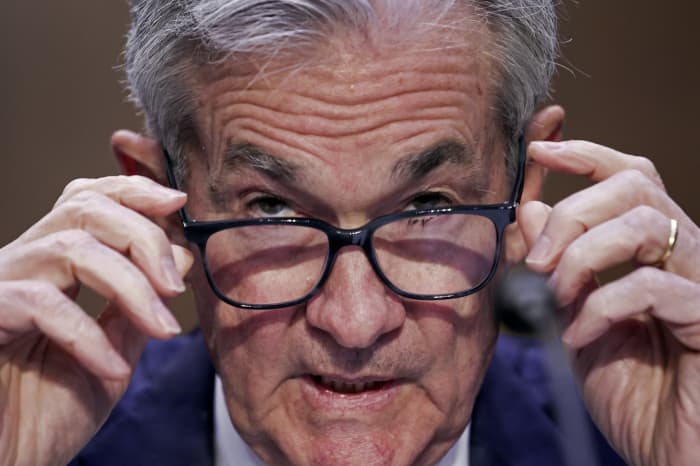
- Latest
- Watchlist
- Markets
- Investing
- Personal Finance
- Economy
- Retirement
- How to Invest
- Video Center
- Live Events
- MarketWatch Picks
- More Latest Watchlist Markets Investing Personal Finance Economy Retirement How to Invest Video Center Live Events MarketWatch Picks
Advertisement Advertisement
Market Extra
Fed’s message to stock market: Big rallies will only prolong painful inflation fight Last Updated: Jan. 5, 2023 at 4:04 p.m. ET First Published: Jan. 5, 2023 at 2:10 p.m. ET ByWilliam Watts
comments‘The proverbial Fed put is officially dead and gone’: strategist

Fed Chair Jerome Powell.
Win McNamee/Getty Images- Email icon
- Facebook icon
- Twitter icon
- Linkedin icon
- Flipboard icon
- Print icon
- Resize icon
It was a “don’t make me come back there” moment from the Federal Reserve.
A line from the minutes of the central bank’s December policy meeting released Wednesday afternoon was taken by analysts and economists as a warning to financial market participants that bets on a policy pivot in 2023 aren’t welcome. And, to the extent that equity rallies and other financial market developments loosen overall financial conditions, those wagers will only force the Fed’s policy-setting Federal Open Market Committee to prolong the pain necessary to bring down inflation.
Read: No Fed official expects an interest-rate cut to be appropriate this year, meeting minutes show
Here’s the line: “Participants noted that, because monetary policy worked importantly through financial markets, an unwarranted easing in financial conditions, especially if driven by a misperception by the public of the Committee’s reaction function, would complicate the Committee’s effort to restore price stability.”
In plain English? “Translated from Fedspeak, the FOMC members do not like stock market rallies, since they fear it could result in potentially inflationary consumer spending,” said Louis Navellier, president and founder of Navellier & Associates, in a Thursday note.
And what can the Fed do about it?
“Said differently, if equities continue to rally on bad economic news, the Fed will need to push forward to an even higher terminal rate and unofficially add ‘weaker stocks’ to the mandate,” wrote Ian Lyngen and Benjamin Jeffery, rates strategist at BMO Capital Markets, in a Wednesday note.
“The minutes revealed another deliberate effort to dissuade the market of the notion that the Fed ‘put’ will be triggered in 2023,” they wrote.
Investors have talked of a figurative Fed put option since at least the October 1987 stock-market crash prompted the Alan Greenspan-led central bank to lower interest rates. An actual put option is a financial derivative that gives the holder the right but not the obligation to sell the underlying asset at a set level, known as the strike price, serving as an insurance policy against a market decline.
“Embedded in this discussion is the question of how much downside in U.S. equities the [Federal Open Market Committee] is willing to weather in its effort to re-establish the forward price stability assumption — [Wednesday’s] official communiqué lowered the level in stocks at which investors will look for a Fed pivot,” the BMO strategists wrote.
The minutes made clear that the “proverbial Fed put is officially dead and gone,” said Kent Engelke, chief economic strategist at Capitol Securities Management, in a Thursday note.
Stocks had bounced off 2022 lows set in October heading into the Fed’s Dec. 13-14 policy meeting, but soon lost traction, losing ground into the end of the month as major indexes booked their worst yearly performance since 2008. Stocks fell Thursday, with the Dow Jones Industrial Average DJIA, -1.02% ending with a loss of around 340 points, or 1%, while the S&P 500 SPX, -1.16% dropped 1.2% and the Nasdaq Composite COMP, -2.45% slumped 1.5%.
Short-dated debt yields rose toward 5% as investors appeared to come around to the Fed’s previous signals that the fed-funds rate would likely peak above that level this year. The minutes showed no Fed officials expected rates to fall in 2023, underlining a divide between the central bank and market participants over the likelihood of a pivot away from tighter policy later this year.
See: ‘Old habits die hard’: Traders take second look at 5%-plus U.S. interest rate by March
The minutes showed no Fed officials expected the policy interest rate would fall in 2023, at odds with market expectations ahead of the release for cuts later in the year.
“The minutes clearly highlight the Fed’s focus on inflation but also their displeasure with the loosening in financial market conditions, which they believed hindered their efforts to achieve price stability,” said Ryan Sweet, chief U.S. economist at Oxford Economics, in a Wednesday note. “Reading the tea leaves, the minutes stress that the Fed is going to reduce inflation at the risk of hurting the labor market and the broader economy.”
Ian Shepherdson, chief economist at Pantheon Macroeconomics, said Wednesday that the mention of financial conditions was meant to convey that investors shouldn’t expect policy makers “to soften their inflation line until it becomes blindingly obvious that a serious shift in the data is under way.”
That shift in data remained elusive Thursday, getting much of the blame for stock-market weakness, after a stronger-than-expected rise in ADP’s estimate of December private-sector payrolls and a drop in first-time claims for unemployment benefits to a 3 1/2-month low last week.
Shares of Silvergate sink after the crypto bank says deposits have plunged. Bed Bath & Beyond says there is 'substantial doubt about the company’s ability to continue.'
William Watts is MarketWatch markets editor. In addition to managing markets coverage, he writes about stocks, bonds, currencies and commodities, including oil. He also writes about global macro issues and trading strategies. During his time at MarketWatch, Watts has served in key roles in the Frankfurt, London, New York and Washington, D.C., newsrooms.
Copyright © 2023 MarketWatch, Inc. All rights reserved.Subscriber Agreement & Terms of Use | Privacy Notice | Cookie NoticeMarketWatch
- Customer Center
- Contact Us
- Newsroom Roster
- Virtual Stock Exchange
- BigCharts
- Copyright Policy
- Manage Notifications
- Cancel My Subscription
Company
- Dow Jones
- Code of Conduct
- Corrections
- Reprints & Licensing
- Digital Self Service
- Your Ad Choices
- Corporate Subscriptions
- Accessibility
- All News
Articles
Video
Podcasts
Authors
Sections
Columns
Symbols
Private Companies
Recently Viewed Tickers
No Recent Tickers
Visit a quote page and your recently viewed tickers will be displayed here.














Comments
0 comment